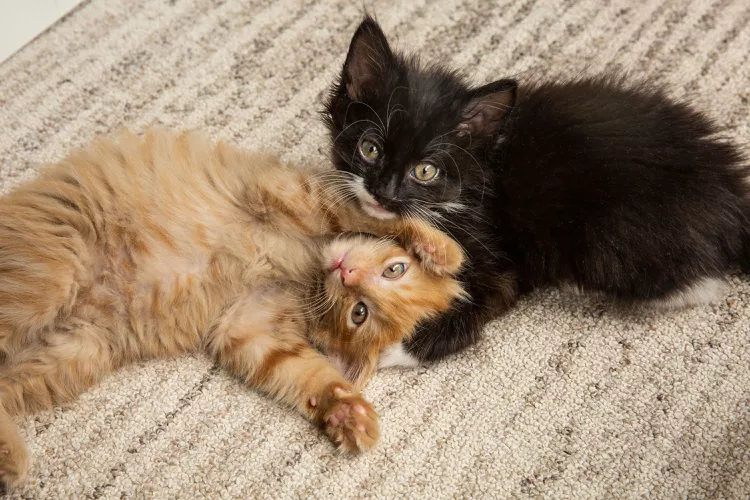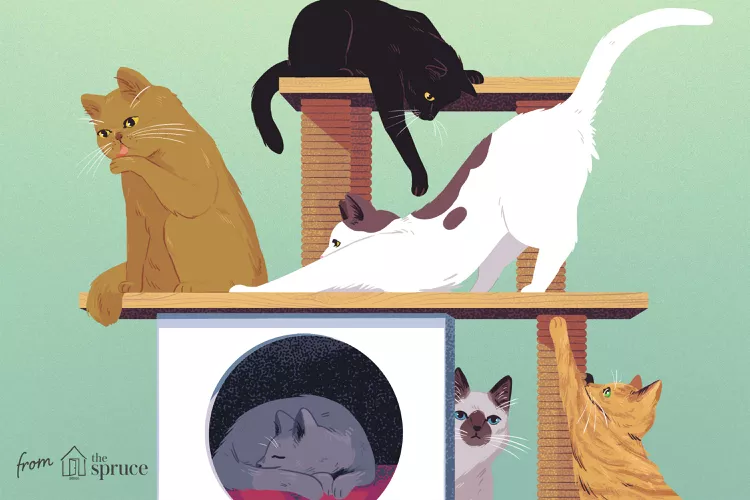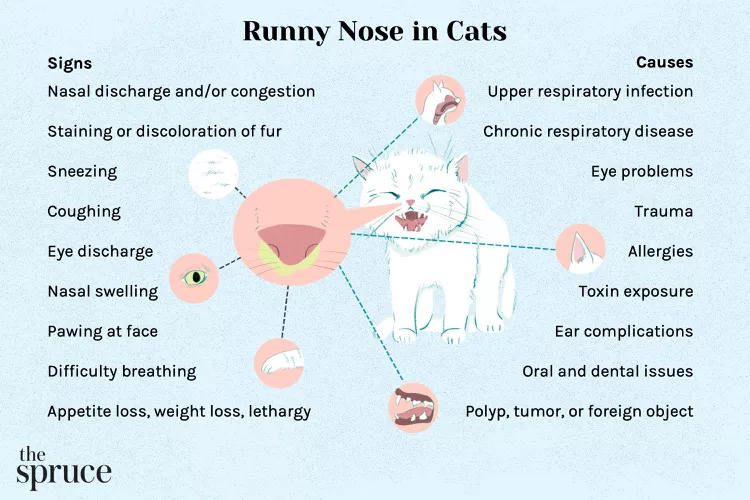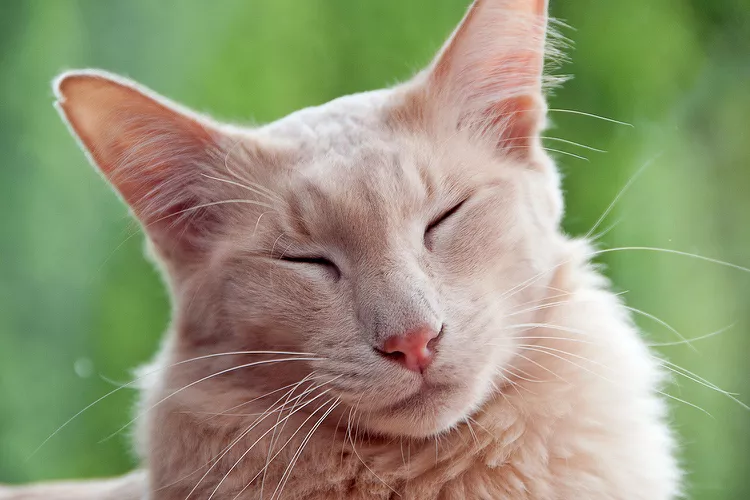
Cats can live a long time. The average lifespan of a cat is about 15 years, which means they'll often even outlive most of our pet dogs. A teenage cat, or even one in their 20s, is not uncommon to see.
Many factors can play a role in determining how long your cat might live. Regular veterinary care, a balanced diet, and a safe environment are crucial for a cat's longevity. Additionally, genetics and lifestyle can significantly impact a cat's lifespan.
Cats have been kept as pets for thousands of years. They originate from the Near East countries where they were domesticated from wild cats to help control rodent populations. These cats spread throughout the world as pets, and we eventually started selectively breeding them for specific traits, thus creating different breeds.
The primary cat breeds were originally bred using cats from four major regions; the Arabian Sea, the Eastern Mediterranean, South Asia, and Western Europe. These four regions have produced cats that have different genetic markers based on what region, or race, they are from.
While it is impossible to know exactly how long a cat will live, some breeds of cats are known to often live longer than others. The Siamese and Manx cat breeds are two that often outlive their cat competition, but other breeds have been recorded as living into their 20s and even 30s. Both purebred and domestic mixed-breed cats have the potential to surpass the average lifespan of the species.
Cats primarily eat meat, so they are considered obligate carnivores, and this should be reflected in the food we feed them. A lot of research has been done to determine the dietary needs of a house cat, so the food options that are available to cat owners are plentiful.
But not all foods are created equal. Adult cats cannot digest large amounts of carbohydrates or lactose, so these are unnecessary ingredients in their food. Carbohydrates can even decrease how much protein is digested, so they are, in fact, harmful to a cat. Proteins, on the other hand, are very important. Cats require a large amount of protein when compared to dogs due to their unique digestive system. Adult cats should receive at least 5.5 grams of protein a day per kilogram of weight. This means the average 8-pound cat (roughly 3.6 kilograms) needs to consume at least 20 grams of protein each day and often much more.
Essential amino acids are also very important to a cat. Taurine, methionine, and cystine are some of these essential amino acids, and without them, important vitamins, and the proper amount of protein, a cat’s health may suffer greatly.
Of course, a cat that doesn’t eat a healthy diet may develop health issues, but parasites and diseases can also affect their health. Some diseases have long-term effects on cats and may also shorten their lifespan.
Poor genetics, immune-compromised cats, and cats that have compromised organ functions might not live as long as healthy cats.
Some cats are considered indoor pets, others are strictly outdoor pets, and others still will be indoor/outdoor pets that split their time between environments. The daily risks that outdoor cats take are much higher than those of an indoor cat, so the lifespan of an outdoor cat is often cut short. Avoiding getting hit by vehicles, hurt by wild animals and eating toxins, finding food, surviving the elements, and being exposed to various parasites and diseases may all be daily challenges for an outdoor or indoor/outdoor cat. The more time a cat spends outside, the greater the risk is of an injury or illness from that environment.
Indoor cats are not exposed to as many risks since they are sheltered inside a secure home. Wild animals and vehicles pose no threats to an indoor cat, their diet is typically controlled, and toxin, parasite, and disease exposures are lessened, especially if they are vaccinated and on preventative medications.
The same is true for big cats like lions, tigers, ocelots, and other wild cats. These cats that reside in zoos often outlive their wild counterparts.
Guinness World Records lists the oldest cat as having lived 38 years and three days. Crème Puff was a domestic shorthair cat that was sometimes fed odd things such as asparagus, eggs, and heavy cream. She was born in 1967 and died in 2005 in Austin, Texas. It is unknown exactly how Crème Puff was able to live to be such an old cat, but a combination of loving care, good genetics, and a safe environment were probably key factors.
While we never have complete control over our cats' lives, we can be sure to offer them a safe, healthy, and loving environment to increase the odds of them living a long life.

Why Two Kittens Are Better Than One
There are benefits of adopting two kittens, such as more feasible training and companionship between them.
Everything You Need to Know About Raising Your First Cat
Whether you are thinking about getting a cat or just adopted your first one, these are the things to know to make your relationship a lasting one.
How Can I Tell the Sex of a Cat?
Telling male and female cats apart can be difficult for those who don't know what they're looking for. Here are helpful tips to discover their sex.
Runny Nose in Cats: Causes and Treatment
Cats get runny noses due to upper respiratory issues, but many conditions can cause this. Learn the causes of runny noses in cats and the associated signs. Find out how vets diagnose and treat cats with runny noses.
How Long Can You Safely Leave Canned Cat Food Out?
You cannot safely leave canned cat food out all day. Twenty to 30 minutes is the max, so give smaller portions and reheat food for later feedings.
Meat Byproducts in Cat Food
Most cat experts recommend premium brands of cat food that avoid ingredients like byproducts and chicken meal. Learn what to look for on the label.
How Much Wet Food to Feed a Cat Every Day
The amount of wet food your cat needs depends on factors such as age, weight, body condition, and lifestyle. Learn how much wet food to feed your cat.
Taurine for Cats
Taurine is an essential animal protein in your cat's diet. Learn more about the various ways it supports your feline's body.
The Different Types of Pet-Friendly Workplaces
Discover the different types of pet-friendly workplaces and the benefits they offer employees. Learn how to create a pet-friendly workplace and the best practices for pet owners.
8 Halloween Safety Tips for Pets
The spooky holiday can be overstimulating and even dangerous for pets. Here's how to avoid the problems caused by toxic candy and incessant doorbells.
Why You Should Keep Cooked Bones Away From Your Dog This Holiday Season
People should be aware of the dangers of cooked bones, especially around the holidays when they might be more accessible to your pup.
Can Dogs Eat Squash? Here's What a A Vet Thinks
Dogs can safely eat squash as long as it's prepared correctly. Find out how to properly feed this versatile fruit to your dog.
16 Small Cat Breeds That Are Petite Purring Machines
Small cat breeds like the Singapura and munchkin may be smaller than an average housecat, but they leave a giant imprint on your heart.
10 Best Cats With Big Ears
Cats with big ears often look extra endearing. Check out some common big-eared cats, including the Abyssinian, Devon Rex, Siamese, Sphynx, and more.
Javanese (Colorpoint Longhair): Cat Breed Profile, Characteristics & Care
The Javanese is a semi-longhaired, color-pointed cat of Siamese type. They are related to the Siamese, Colorpoint Shorthair, and Balinese breeds.
How to Stop Aggression in Dogs
Dog aggression can be a serious behavior issue for pet owners. Learn how to stop aggression in dogs before someone gets hurt.
Should Dogs Be Allowed on Furniture?
Should you let your dog on the couch or in the bed with you? Are there any reasons we should not let dogs on the furniture? Here's what to know.
Why Do Dogs Eat Rocks?
One of the most common non-food items for dogs to eat are rocks. Here's what to know about why dogs eat them and how can you stop your dog from eating rocks.
Why Dogs Get Aggressive and How to Stop It
Why is your dog biting you aggressively? Sometimes dogs can become aggressive with little warning. Find out what causes your dog to become aggressive so you can work with the behavior.
Thai Ridgeback: Dog Breed Characteristics & Care
Learn all about the Thai Ridgeback, a rare breed from Thailand. Find out how to care for the loyal dog and where to buy or adopt one.